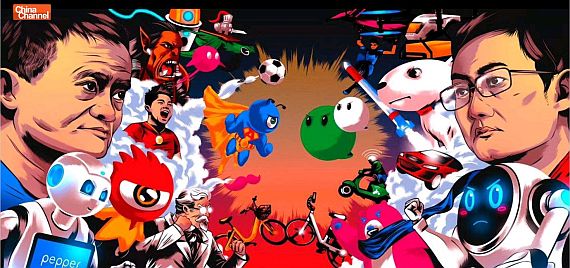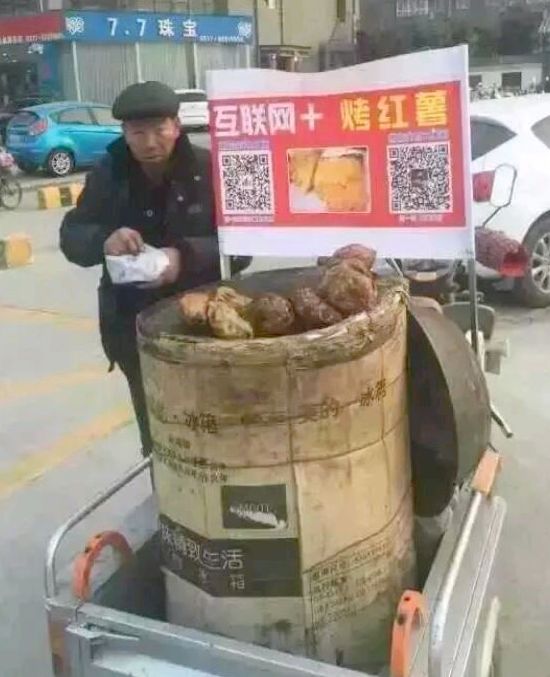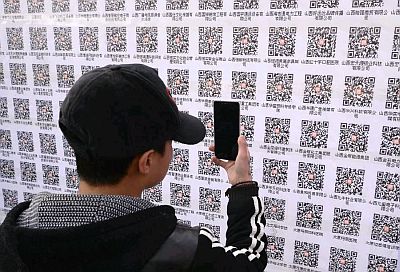Successful premiere: m2C Conference in Prague offers deep insights into digital China
 |
| Two men who want to devide China and the world: Alibaba founder Jack Ma on the left, Tencent founder Ma Huateng on the right. They allegedly hate each other. People are currently talking about this caricature. / photo: China Channel |
Prague (February 15, 2019). Alibaba, Tencent, WeChat, Mini Program, KOLs, digital payments, retail and consumer trends… The new m2C / marketing to China Conference offered deep insights into China's world of marketing and e-commerce at the end of January in Prague. The premier event, which was accompanied by hospitalityInside.com as media partner during two days, presented itself as a trend mirror with strong content of the world's largest travel, consumption and digital market. A first summary and introduction into the "app economy China".
China is hyper-dynamical and only knows superlatives. This is no surprise as the state moves and directs masses of people on a daily, hourly, minute basis – and the internet does so every second. Without online, nothing works any more. Mega business conglomerates, such as Tencent and Alibaba, are seeing to that. The activities of these businesses also touch tourism: Both business leaders, Ma Huateng at Tencent and Jack Ma at Alibaba, hate each other already, as several speakers pointed out. One copies the tools of the other to improve them and snatch away customers even faster. "Business is like war," said speaker Bo Ji at the beginning of the m2C; he is Assistant Dean and Chief Representative for Europe at the Cheung Kong Graduate School of Business – China's first private and independent non-profit business school.
This is a sentence, which scares European souls: In this part of the world, business is hard competition but no war. Bo Ji's attempt to transfer the quintessence from the book "The Art of War" by the famous military strategist and philosopher Sun Tzu to the modern business world, led to military wording. Bo Ji spoke of "money war", "battle grounds", "aggressive walks", and finally of "total victory" – which concluded in the sentence: "Winning is not the goal. Total victory is far more important."
 |
|
| Bo Ji sees the roots of Chinese business strategies in the words and works of the great fighter Sun Tzu. / photo: private |
Bo Ji worships Sun Tzu and recommends the book of the former Chinese warrior, who died 2,500 years ago (he lived 545-496 B.C.), to every CEO as a must read, "in order to really understand the Chinese". Regretfully, he concluded that a totally new age has begun: "With WeChat, we have stopped giving birth to philosophers."
The WWW is the battleground of the new era. In business life, uncompromising analyses and permanent adaptations to constantly changing situations lead to "total victory". According to Bo Ji, on the other hand, this results in the fact, that the Chinese keep delaying decisions and just let it flow.
Between super apps and Mini Program
China has set off into a new philosophy: the one of the ultimate commerce, driven by the goal of total digitalisation. China has become an "app economy", formed by decision makers such as Ma Huateng and Jack Ma, whose empires are so-called "super apps". And every subsidiary produces more apps, grows and becomes another super app, penetrates everyday life of the users and controls their behaviour.
Let's stay with the example of WeChat, the Chinese "WhatsApp", which has already become much more than a communications channel. "WeChat is everything in one: Facebook, Google, Instagram, Twitter, Amazon… everything in one app! Even in restaurants you don't need cashiers any more, only WeChat with WePay," describes Matthew Brennan the multi-functionality of this super app; in China, (nearly) nothing works any more without this app. The native Briton, who has lived in China for 15 years and is also married to a Chinese woman, was employed at Tencent back then; today, with his own company China Channel, he cooperates closely with the Tencent subsidiary WeChat, amongst others. In Prague, he presented the WeChat "Mini Program", which is still quite unknown in Europe. This is an idea where you are able to programme mini apps (yourself!) and to offer new services offline. There are already one million Mini Programs available; in two years' time, there might be already 1.5 million versions available (a detailed article on this topic will follow).
 |
|
| No street trading without QR Code! China's society is cashless. / photo: China Channel |
This is only one example for the daily inventive spirit of the Chinese and the people's quick enthusiasm for innovations. "In 2018, China created a unicorn every 3.8 days," stated the "South China Morning Post".
With their smartphones in their hands, the Chinese easily move through the country. The internet works everywhere, which made the people impatient. Websites, that do not open within three seconds, will be clicked away. Here is an insider tip for everyone, who wants to operate websites in China: They have to be on a Chinese server to be able to open that fast. And they have to be politically "clean": This is being checked by students in Shanghai, appointed by the government, as explained by one of the speakers. 300 young people systematically comb through the web for wording.
My smartphone, my life
In everyday life, nobody thinks about such things. Chinese people simply take out their smartphones and use them everywhere. They are increasingly activating the QR code – for payments or to receive immediate information about products or tourist attractions. In the cities, nobody uses cash any more. "Even at the street vendor, they only pay via QR code," said Matthew Brennan. Or they pay with their faces. Face recognition is coming: for paying in restaurants, withdrawing money at cash machines. Artificial intelligence is able to filter the right face out of a group, can identify the person even if he or she is wearing a wig or heavy make-up… A video is proof of a respective experiment.
Apps, QR codes and face recognition make life easy. If a customer pays a burger via WeChat, he can collect WePay points at the same time. The receipt for the burger will be printed out and it also contains a QR code. If this code is activated, the receipt will be transferred directly into the personal accounting system. 20 minutes later, the burger chain sends an automated message to the customer and asks for a rating of the service. But this can happen even faster: When a guest is waiting at the hotel reception, his smartphone automatically recognizes the staff member and an evaluation tool for this staff member will pop up immediately on the phone's screen – just one click, done.
 |
|
| QR Codes for everything and everywhere. Cashless payment and retrieval of information is increasingly linked to bonus points. / photo: China Channel |
Chinese people and apps are evolving around one another
"The giants are creating an entire eco system around the customer," summarised Jan Smejkal, a young entrepreneur and business inventor. The native Czech, who has moved to China in the meantime, managed his entire apartment move via the app "Ziroom" within three hours, for example. "Via app, you can look for an apartment in your neighbourhood. The app suggests visiting dates, offers an agreement, I am able to order a house moving team as well as a cleaning service. I only have to sign once for all this." Because Alibaba as well as Tencent want to retain their customers, they offer respective apps to people for things that are still missing: table, toaster or towels can be ordered via Alibaba's purchasing platform Taboao, for example. "In the shop's app, you are able to immediately chat with a sales person, you obtain prompt answers, and everything is delivered within a few days."
"In 2017, 40 billion parcels were delivered in the country in 2017, up 28% from the year before. The figure has increased 33 times just in the last decade," said Jan Smejkal, quoting the Nikkei Asian Review. And Goldman Sachs estimates estimates China to handle 250 million daily deliveries by 2020.
The life of a Chinese citizen evolves around the app and the app evolves around the Chinese citizen. The network becomes tighter and more "personal", which also correlates with the integrated payment systems. They are becoming a real power factor. Alibaba's Alipay still ranks first with a 54-percent market share in China, but WePay follows closely with already 38 percent, reported Jan Smejkal. Matthew Brennan added that the payment systems are interconnected more closely with loyalty programmes. "There is a huge potential – this will become the new playground for e-commerce"! The competition about products is slowly becoming a competition about personalised products. KOLs – key opinion leaders – are playing an important role here. You will find more on this topic in our next edition. / Maria Puetz-Willems
| THE m2C PREMIERE IN PRAGUE… ...scored with top-level speakers – and suffered a little from the fact that nearly only Chinese people talked. Some listeners would have wished for a better mixture including western/European protagonists and more discussions instead of lectures. Nevertheless, everybody liked the idea of this platform, which enabled many personal discussions among the small circle of 150 participants. This is a good foundation; the next follow-up events are already planned for London (2019) and Germany (2020). / map |
To print this article you have to be registered and logged in for newsletter, visitor or subscription.





